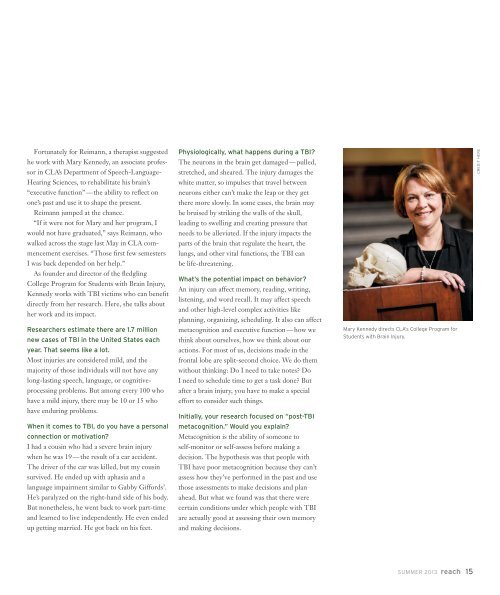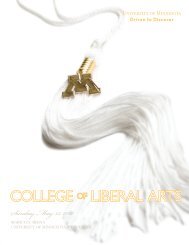View as PDF - College of Liberal Arts - University of Minnesota
View as PDF - College of Liberal Arts - University of Minnesota
View as PDF - College of Liberal Arts - University of Minnesota
You also want an ePaper? Increase the reach of your titles
YUMPU automatically turns print PDFs into web optimized ePapers that Google loves.
Fortunately for Reimann, a therapist suggested<br />
he work with Mary Kennedy, an <strong>as</strong>sociate pr<strong>of</strong>essor<br />
in CLA’s Department <strong>of</strong> Speech-Language-<br />
Hearing Sciences, to rehabilitate his brain’s<br />
“executive function” — the ability to reflect on<br />
one’s p<strong>as</strong>t and use it to shape the present.<br />
Reimann jumped at the chance.<br />
“If it were not for Mary and her program, I<br />
would not have graduated,” says Reimann, who<br />
walked across the stage l<strong>as</strong>t May in CLA commencement<br />
exercises. “Those first few semesters<br />
I w<strong>as</strong> back depended on her help.”<br />
As founder and director <strong>of</strong> the fledgling<br />
<strong>College</strong> Program for Students with Brain Injury,<br />
Kennedy works with TBI victims who can benefit<br />
directly from her research. Here, she talks about<br />
her work and its impact.<br />
Researchers estimate there are 1.7 million<br />
new c<strong>as</strong>es <strong>of</strong> TBI in the United States each<br />
year. That seems like a lot.<br />
Most injuries are considered mild, and the<br />
majority <strong>of</strong> those individuals will not have any<br />
long-l<strong>as</strong>ting speech, language, or cognitiveprocessing<br />
problems. But among every 100 who<br />
have a mild injury, there may be 10 or 15 who<br />
have enduring problems.<br />
When it comes to TBI, do you have a personal<br />
connection or motivation?<br />
I had a cousin who had a severe brain injury<br />
when he w<strong>as</strong> 19 — the result <strong>of</strong> a car accident.<br />
The driver <strong>of</strong> the car w<strong>as</strong> killed, but my cousin<br />
survived. He ended up with aph<strong>as</strong>ia and a<br />
language impairment similar to Gabby Giffords’.<br />
He’s paralyzed on the right-hand side <strong>of</strong> his body.<br />
But nonetheless, he went back to work part-time<br />
and learned to live independently. He even ended<br />
up getting married. He got back on his feet.<br />
Physiologically, what happens during a TBI?<br />
The neurons in the brain get damaged — pulled,<br />
stretched, and sheared. The injury damages the<br />
white matter, so impulses that travel between<br />
neurons either can’t make the leap or they get<br />
there more slowly. In some c<strong>as</strong>es, the brain may<br />
be bruised by striking the walls <strong>of</strong> the skull,<br />
leading to swelling and creating pressure that<br />
needs to be alleviated. If the injury impacts the<br />
parts <strong>of</strong> the brain that regulate the heart, the<br />
lungs, and other vital functions, the TBI can<br />
be life-threatening.<br />
What’s the potential impact on behavior?<br />
An injury can affect memory, reading, writing,<br />
listening, and word recall. It may affect speech<br />
and other high-level complex activities like<br />
planning, organizing, scheduling. It also can affect<br />
metacognition and executive function — how we<br />
think about ourselves, how we think about our<br />
actions. For most <strong>of</strong> us, decisions made in the<br />
frontal lobe are split-second choice. We do them<br />
without thinking: Do I need to take notes? Do<br />
I need to schedule time to get a t<strong>as</strong>k done? But<br />
after a brain injury, you have to make a special<br />
effort to consider such things.<br />
Initially, your research focused on “post-TBI<br />
metacognition.” Would you explain?<br />
Metacognition is the ability <strong>of</strong> someone to<br />
self-monitor or self-<strong>as</strong>sess before making a<br />
decision. The hypothesis w<strong>as</strong> that people with<br />
TBI have poor metacognition because they can’t<br />
<strong>as</strong>sess how they’ve performed in the p<strong>as</strong>t and use<br />
those <strong>as</strong>sessments to make decisions and plan<br />
ahead. But what we found w<strong>as</strong> that there were<br />
certain conditions under which people with TBI<br />
are actually good at <strong>as</strong>sessing their own memory<br />
and making decisions.<br />
Mary Kennedy directs CLA’s <strong>College</strong> Program for<br />
Students with Brain Injury.<br />
Credit Here<br />
SUMMer 2013 reach 15




